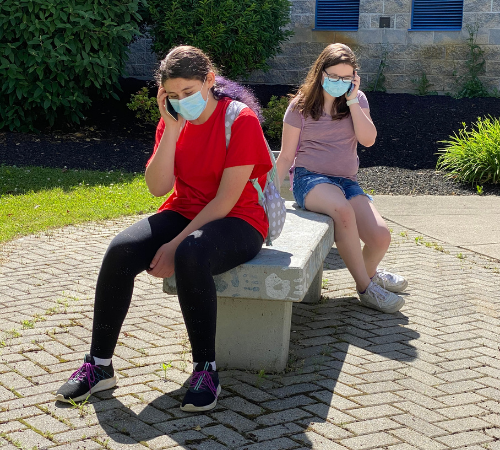Youth work uses educational processes, delivered in an informal environment, to help develop young people’s social and emotional development. Youth organisations offer vital services to young people which include diverse activities to participate in, a place to go and spend time with their peers, or a trusted adult to talk to on their terms. Youth organisations often work with ‘hard-to-reach’ young people who may have disrupted experiences of education and be at-risk of social exclusion.
In January 2021, a third national lockdown was announced to help control a rapid increase in COVID-19 infections. Young people are significantly affected by this as schools and colleges are closed to most young people and required to move teaching on-line. As outlined by guidance provided by the National Youth Agency, youth organisations are also facing greater restrictions in how they are able to provide services to young people. This comes at a time when young people may need more support to avoid the pandemic impacting their well-being and life chances over the longer term.
The study
As part of the Elizabeth Blackwell Institute Rapid Response to COVID-19 we carried out a qualitative study, to examine how the COVID-19 pandemic affected the ways in which services are delivered by three different youth organisations in Bristol. During October and November 2020, we interviewed staff members and volunteers from three youth organisations in Bristol, alongside 20 young people aged 12 to 18 years who access their services.
Supporting young people during lockdown
All youth organisations reported adapting their services to enable provision of support to young people. When face-to-face contact was not allowed during the strictest periods of lockdown, youth workers tried to maintain contact with young people they worked with. Digital platforms, such as Zoom, were successfully used to bring young people together in groups or carry out different activities (e.g. job searching, exercise classes, craft sessions). However, not all young people were able, or felt comfortable enough, to use digital platforms. In cases when young people were not available by phone, this meant some young people had more limited contact and support from youth workers during lockdown.
The positive relationships developed between youth workers and young people were often discussed. Building on these existing relationships, youth workers were still able to offer support even if this was remotely. One young woman, aged 17 years, commented on how this benefited her during the initial stages of lockdown: ‘It was quite upsetting at the start [of lockdown] because I suddenly had all of this like anger and rage that wasn’t being processed properly but I just used to call [youth worker] and talk to him instead of obviously being able to train it out. I’d talk to him about it until I felt fine again.’
Young people were appreciative of the efforts youth workers had made to keep in touch during lockdown. However, youth workers and young people alike welcomed the gradual return to face-to-face sessions as lockdown measures began to relax over the summer. Young people reported the benefits of being able to take part in activities and socialise with their friends, or being distracted from difficulties they may experience at school or home. One young woman, aged 12 years, explained: ‘I really missed coming up here [youth organisation] because then you get more stuff to do instead of staying at home.’
In addition to supporting young people, staff at youth organisations also contributed to initiatives to address additional social needs identified within their communities. This included delivery of food parcels to families and the distribution of laptops, tablets and mobile sim cards with data for young people with limited digital access. One 15-year-old male participant articulated his gratitude as follows: ‘[Youth worker] was bringing it every week, like a nice big amount of food, so it was good and helpful for my mum as well because sometimes she’s struggling for like money for food, that drop would come and then we’d be okay.’
Ensuring young people’s longer-term access to youth services
We found that youth organisations played an important role in helping support vulnerable young people and the wider community during lockdown. Provision of services face-to-face had additional value for young people and should be prioritised when it is safe to do so.
Over the last decade significant cuts in spending on youth services have left vulnerable young people without access to vital support. This is now further affected by the impact of the COVID-19 pandemic. According to a recent survey undertaken by UK Youth, nearly two-thirds of youth organisations have been operating at a reduced level since the pandemic began. Worryingly, one-third may have to shut in the next six months because of a lack of funding. This comes at a time when young people are more than ever in need of help and support.
Additional funding for youth organisations hardest hit by the impact of COVID-19 has recently been announced. Although this investment is welcomed, the availability of longer-term funding is urgently required to ensure provision of essential youth services to vulnerable young people can be guaranteed.
